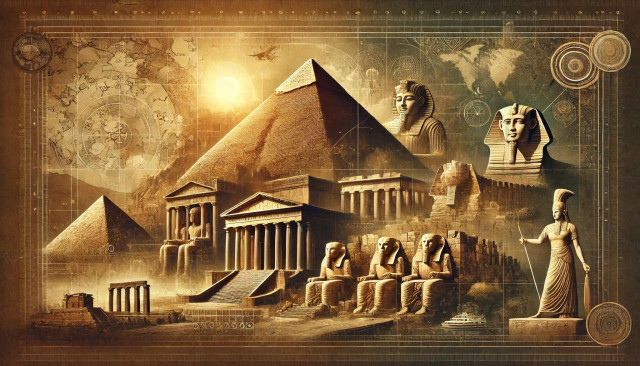Ancient civilizations laid the foundation for modern society, contributing to everything from government and technology to art, philosophy, and religion. These early cultures, although sometimes long gone, left a legacy that continues to influence the world today. From the fertile crescent to the distant shores of the Americas, here are the ten most influential ancient civilizations that have stood the test of time.
Mesopotamia: The Cradle of Civilization
The ancient civilization of Mesopotamia, located between the Tigris and Euphrates rivers (modern-day Iraq), is often referred to as the "Cradle of Civilization." Mesopotamians invented writing (cuneiform), established the first cities, and laid the groundwork for legal systems. The Sumerians, Akkadians, Babylonians, and Assyrians all contributed to advancements in astronomy, mathematics, and law, with the Code of Hammurabi being one of the earliest and most influential legal documents.
Ancient Egypt: The Land of the Pharaohs
For over 3,000 years, ancient Egypt was a dominant civilization in northeastern Africa. Known for its monumental achievements, including the construction of the pyramids, the ancient Egyptians excelled in medicine, mathematics, engineering, and art. They were also pioneers in writing, with their hieroglyphic script. The religion, governance, and culture of Egypt heavily influenced other societies, especially in the Mediterranean region.
Indus Valley Civilization: A Mysterious Ancient Society
One of the oldest urban cultures, the Indus Valley Civilization thrived between 3300 and 1300 BCE in present-day Pakistan and northwest India. The civilization is notable for its advanced urban planning, sophisticated drainage systems, and the impressive cities of Harappa and Mohenjo-Daro. Despite their many accomplishments, much about the Indus Valley civilization remains a mystery due to the undeciphered script and the lack of monumental records.
Ancient China: The Middle Kingdom
China’s ancient civilization spans over 5,000 years and is one of the world's longest continuous cultures. From the Xia Dynasty to the Tang Dynasty, ancient China contributed greatly to technology, philosophy, and governance. The invention of paper, gunpowder, the compass, and printing transformed the world. Philosophies like Confucianism and Taoism originated here, influencing not only China but East Asia as a whole.
Ancient Greece: The Birthplace of Democracy and Philosophy
Ancient Greece is renowned for its contributions to philosophy, science, art, and politics. The concept of democracy, especially the form practiced in Athens, was groundbreaking and has greatly influenced modern political systems. Philosophers like Socrates, Plato, and Aristotle laid the foundations for Western thought. Greek culture also spread far and wide through Alexander the Great's conquests, leaving a profound impact on the Hellenistic world.
The Roman Empire: Mastery of Governance and Military Strategy
The Roman Empire, which at its height spanned three continents, is one of the most powerful civilizations in history. Known for its military prowess, engineering marvels (like aqueducts and roads), and innovations in governance (such as the Roman Republic and later the Empire), Rome's influence on law, politics, and culture is still evident today. The Roman legacy has shaped Western civilization, particularly in areas like governance, law, and architecture.
The Maya Civilization: Masters of Astronomy and Architecture
Flourishing in Central America, the Maya civilization was known for its advanced knowledge of astronomy, mathematics, and architecture. The Maya developed an accurate calendar system and built impressive structures, such as the pyramids of Tikal and Chichen Itza. Their written language, known as hieroglyphs, and their contributions to mathematics (including the concept of zero) were highly advanced for their time.
Ancient Persia: The Achaemenid Empire
The Persian Empire, particularly during the Achaemenid Dynasty (550–330 BCE), was one of the largest and most influential empires of the ancient world. Stretching from the Indus Valley to Egypt and parts of Europe, it introduced systems of governance, communication, and infrastructure. The Persian king Darius I instituted monumental reforms, including the establishment of a postal system, and promoted tolerance among the diverse peoples within the empire. The empire’s influence stretched into the arts, religion, and political systems of later civilizations.
The Inca Empire: A Mountain Kingdom
The Inca Empire, the largest empire in pre-Columbian America, flourished in the Andes Mountains from the early 15th century until the Spanish conquest in the 16th century. The Incas excelled in engineering, building impressive road networks and agricultural terraces. Their capital, Cusco, became a hub for advanced mathematics, astronomy, and architecture. Despite not having a written language, the Incas maintained a sophisticated society through their quipu system, a series of knotted cords used for record-keeping.
Ancient Egypt: The Kingdom of Kush
While Egypt is the most well-known civilization of northeastern Africa, the Kingdom of Kush (modern-day Sudan) played a significant role in the history of the Nile Valley. Kush was a powerful kingdom that ruled over Egypt at various points in history, including the 25th Dynasty, known as the "Kushite Dynasty." The Kushites built pyramids, established a complex society, and were influential in the spread of Egyptian culture. They also excelled in trade, metallurgy, and military strategy.
These ancient civilizations left behind legacies that continue to shape the modern world. From the brilliant engineering feats of the Egyptians and Romans to the philosophical and democratic ideas of the Greeks, their achievements have had a profound impact on human development. Though many of these cultures have faded away, their influence persists, reminding us of the timeless quest for knowledge, innovation, and the building of great societies.




















